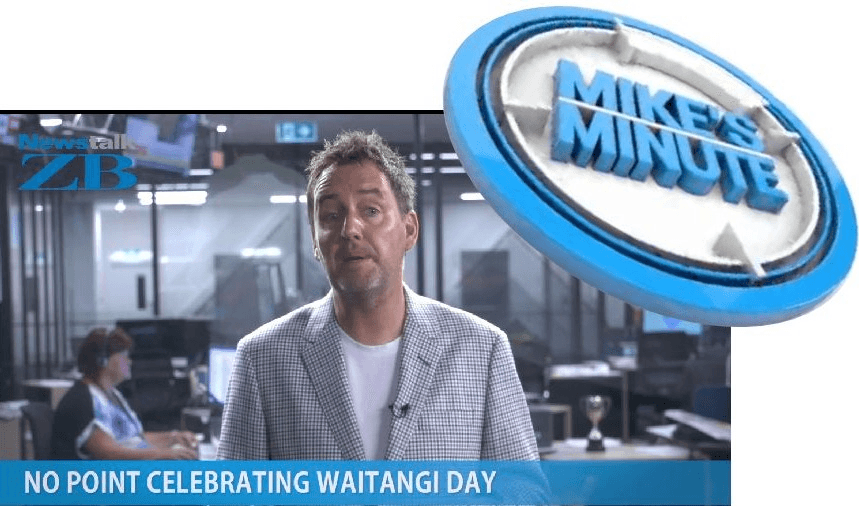You’re a great talker, but when it comes to Waitangi and Māori you’d do well to take my course, and listen for a change, writes Dr Hirini Kaa.
Dear Mike (and all your fans across various media outlets)
Have I got an opportunity for you! I would like to invite you this semester to enrol in my history course at the University of Auckland Waitangi: Treaty to Tribunal.
A little piece you did the other day, titled “No Point Celebrating Waitangi Day” really caught my eye. After watching for the entire minute and reading the responses I felt not depressed but really upbeat. I know how you love upbeat, Mike! And I was upbeat because I know what would help you and your followers – some learning.
First of all, though you didn’t directly refer to it, I’m sure you as a clever guy understand the Treaty of Waitangi. You know, all that stuff like how it came about, what is in it, its role in New Zealand history and society – all pretty complex stuff. I mean, surely you wouldn’t just talk about a topic without knowing much about it? Surely.
In any case, you and your audience might well benefit from understanding how some of the greatest minds this country has produced worked their way through to where the Treaty finds itself today. For example, you might benefit from knowing about Justice Robin Cooke’s 1987 finding that the treaty “signified a partnership between Pākehā and Māori”.
Partnership would be a good concept for you to reflect on throughout the course. Sometimes partnership – and the test of “utmost good faith” – involves listening to others. So rather than just writing off what some are saying at Waitangi as “depressing” and “attention seeking”, you would have to take the opportunity to actually listen. And listening, Mike, means something more than just a pause for breath in your own lecture.
You could also find out that the history of protest at Waitangi is not a modern occurrence created to seek attention from the cameras (funny how that’s the first thought in your head). You might discover the history of Māori seeking to honour the Treaty goes back to, well, 1840. And that Kingi Taurua, rather than being a “broken record” and part of “an annual ritual of abuse, anger and ignorance” is actually upholding a long and immensely patient movement for justice.
Your followers, the ones who write things like Māori are “a culture founded on ‘what can I get without working for it’” might like to learn that the Treaty continues to be a huge driver for positive transformation in this country. Alongside the haka that every schoolboy in the country now seems to do comes an awareness of tangata whenua and what’s important to the other partner in this nation, all of which helps to build fundamentally healthier race relations. You could learn how iwi economic development is becoming a substantial driver for this nation’s economy, led in no small part by the Treaty and the Waitangi Tribunal. What’s not to be “positive” about?
Yes, the Waitangi Tribunal. You would have an opportunity to reflect on this globally respected body. You could discover how it wasn’t actually the product of rampant PC-gone-madism that your admirers often portray it as. I mean, it was founded in 1975, when cigarettes were awesome and you could be arrested for being gay.
Doing my course might even improve your communication style. Yes, you are a great talker. Very slick. I know you are used to talking in (and your followers listening to) soundbites: short, snappy sentences that are so well delivered they seem to mean something. It’s the sort of style that has served Donald Trump well. But sometimes you need to go deeper to actually understand an issue. Sometimes jamming a complex idea in between advertisements and entertainment news just won’t get enough data across.
So when you do my paper you will have a chance to reflect on what you are talking about. Sure, you will have to listen to me in lectures but that’s really just to get you started. You then get to dissect my stuff with your peers in tutorials – and, if you wish, rip it apart in your own research.
Maybe you’ll write a “research essay”, which is pretty much what it sounds like. Your thinking could draw on research driven by decades of writing and thinking by some amazingly clever people. So you will check in with the work of (among others) Claudia Orange, James Belich, Ranginui Walker, Aroha Harris, Keith Sinclair, Keith Sorrenson alongside tens of thousands of pages of work by the claimants, counsel, crown and members of the Waitangi Tribunal.
And then you get to write up a sustained evidence-based argument in which you can go all out in your attack on Waitangi Day. It’s more than a one-minute ramble, and afterwards you may pause before giving your followers ammunition to call this all “newly created myths”, for example.
If you are seriously willing to take part in the global standards of intellectual discipline required at university-level study (and assuming you have passed the requisite stage one papers) then you’re welcome to come and work towards a Bachelor of Arts at a world-ranked university.
Dr Hirini Kaa is a lecturer in the School of Humanities at the University of Auckland




